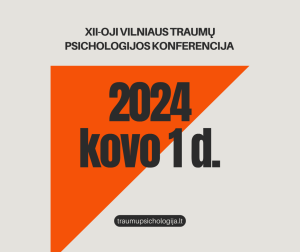Posttraumatic stress and psychological support
A traumatic event is an event that threatens a person’s life or health. A person may experience the threatening event themselves, may witness it, or may learn that someone close to them (for example, a family member or friend) has experienced it. A traumatic event can include childhood or adult abuse, sexual abuse, domestic violence, assault, accidents, natural disasters, and other incidents that may endanger a person’s life or health. Research shows that about 81.4% of people experience at least one traumatic event in their lifetime (Kvedaraite, Gelezelyte, Kairyte et al., 2021).
Traumatic events affect everyone – after a devastating event, everyone is stressed, and people need time to recover. However, 5.8-13.9% of individuals experience high levels of stress following a traumatic event(s) (Kvederaite, Gelezelyte, Kairyte et al., 2021; Kvedaraite, Gelezelyte, Karatzias et al., 2021), which can lead to posttraumatic stress disorder (PTSD). Symptoms of PTSD can only appear when a traumatic event has occurred. Post-traumatic stress can occur in a wide range of intensities and always affects a person’s daily life – interactions with others, studies and/or work, leisure activities.
The main symptoms of PTSD are listed below:
- A constant recollection of the traumatic event.
- Recurrent and intrusive memories of the traumatic event, usually arise spontaneously and bother the person continuously.
- Suddenly occurring images of the event, may last from a few seconds to several hours. Such images are often accompanied by anxiety, sweating, a hard heartbeat and increased breathing.
- The person usually avoids cues or situations related to the traumatic event (e.g., if attacked in a lift, avoid using it).
- Efforts to avoid thoughts and feelings related to the trauma as they can be very strong and unpleasant.
- A persistent state of irritability may persist, and the person may be excessively frightened by cues related to the traumatic event.
- Individuals who have experienced traumatic events may feel constant tension, a constant sense of threat and an expectation that something bad could happen at any moment.
Post-traumatic stress reactions can also manifest themselves in the following difficulties:
- Sleep disturbances – a traumatic event can make it harder to fall asleep, nightmares related to the event often wake you up at night, and fear of falling asleep can occur.
- Difficulty concentrating, impaired memory, often resulting in trauma victims becoming withdrawn, angry, finding it harder to communicate with others, and outbursts of anger or aggression.
- Traumatised individuals may be reluctant to discuss their feelings or experiences with others for fear of being misunderstood or because of feelings of shame or guilt. The person may become extremely cautious to avoid painful conversations about unpleasant experiences and to avoid frightening others.
- Traumatised people may be prone to alcohol or drug abuse.
More complex post-traumatic reactions can occur after particularly severe, prolonged, or repeated traumatic events, such as prolonged domestic violence, repeated physical or sexual abuse in adulthood or childhood, etc. Experiencing extreme psychological distress for more than three months after a traumatic event can lead to the development of Complex Post-Traumatic Stress Disorder (CPTSD), which has a prevalence of 1.8-10% in the Lithuanian population (Kvederaite, Gelezelyte, Kairyte et al., 2021; Kvedaraite, Gelezelyte, Karatzias et al., 2021). The disorder is characterised by all three symptoms of PTSD, plus the following psychological difficulties: 1) severe and persistent difficulties in regulating emotions, which can range from an inability to control one’s own emotions to emotional numbness; 2) a persistent belief that the person is unworthy and unimportant; and 3) persistent difficulties in interpersonal relationships. Like PTSD, CPTSD always affects a person’s daily life. Complex Post-Traumatic Stress Disorder has been officially recognised and included in the International Classification of Diseases: Version 11 (ICD-11) in 2018.
Psychological support
If the traumatic event is followed by extreme stress that interferes with daily activities and the person is thought to be suffering from post-traumatic stress, it is recommended that you seek specialist advice from psychologists or psychiatrists to accurately assess your post-traumatic stress reactions and to identify the most appropriate treatment options. Over the last couple of decades, research has shown that the most effective way to help traumatised people is through specialised psychological support. Psychological support can be very effective, even if a person has been experiencing difficulties for months or even years.
In Lithuania, there are currently two specialised methods for working with trauma survivors – Eye Movement and Desensitisation and Reprocessing (EMDR) and Brief Eclectic Psychotherapy for PTSD (BEPP). A list of professionals trained in these methods can be found here. A more detailed description of the therapeutic approaches is below.
Eye Movement and Desensitisation and Reprocessing (EMDR)
It is a comprehensively researched therapy, proven to be effective in the treatment of psychological trauma by scientific studies. This therapy allows people to alleviate symptoms and emotional difficulties that are the result of devastating life experiences. It is a form of therapy that focuses on memories of traumatic and/or stressful experiences that may contribute to mental disorders or psychological problems. EMDR enables people to heal from symptoms and emotional difficulties. To date, EMDR has helped millions of people of all ages to alleviate psychological distress. In this therapy, pathology, psychological and emotional difficulties are understood as unprocessed memories that are stored in memory as they were experienced. Irrational beliefs or negative behaviours are seen as reactions to past events. It is a symptom, not the cause of the problem. Using structured protocols and procedures taught in certified EMDR therapy training, practitioners learn how to help clients activate their natural ability to process and constructively cope with adverse experiences and psychological trauma. This therapy can help to come to terms with experiences that have had a negative impact on one’s life and to move forward with a positive, hopeful attitude, while at the same time improving one’s sense of personal strength, ability to face difficulties confidently, to engage in life and to make choices freely. The main effect of this therapy is that clients feel empowered and strengthened by experiences that previously made them feel inferior. EMDR therapy is used in 32 European countries and is recognised as an effective method for treating psychological trauma by major health organisations such as the World Health Organisation, the American Psychiatric Association, and the U.S. Department of Defense.
For more information on EMDR therapy, visit the EMDR Europe page.
Research on the effectiveness of EMDR:
https://www.nature.com/articles/s41586-019-0931-y.pdf?origin=ppub
https://journals.plos.org/plosone/article?id=10.1371/journal.pone.0045753
Brief Eclectic Psychotherapy for PTSD (BEPP)
It is an individual therapy designed to help people face and process their traumatic experiences. This therapy allows you to cope with the symptoms of post-traumatic stress disorder by remembering the traumatic event and processing the strong emotions it triggers. The aim of the therapy is to reduce the symptoms of PTSD experienced by clients, to help them integrate the traumatic event into their lives and to help them regain the control they have lost. BEPP helps to let go of and access and process painful thoughts or emotions. The therapy has been developed to provide support specifically for post-traumatic stress disorder. BEPP therapy focuses on the memories, thoughts and feelings associated with the traumatic event and the impact they have had on the person’s life. The therapy is described as eclectic as it combines effective elements from different schools of psychotherapy. Treatment usually consists of 16 sessions lasting 45-60 minutes. Each session has its own unique purpose and a clear place in the different stages of the BEPP approach. The sessions consist of a specific plan that includes the following elements: explanation of the aims and content of the therapy, psychoeducation on post-traumatic stress, relaxation exercises, exposure to the trauma in the imagination and updating and discussing it, cues and focusing on them, a writing exercise, making sense of and integrating it, focusing on the aspects of everyday life, a farewell ritual and an evaluation of the therapy. After the therapy session, the patient may feel temporarily anxious about the memories brought back during the consultation. However, this is a sign that progress is being made in the treatment process.
Research on the effectiveness of BEEP:




